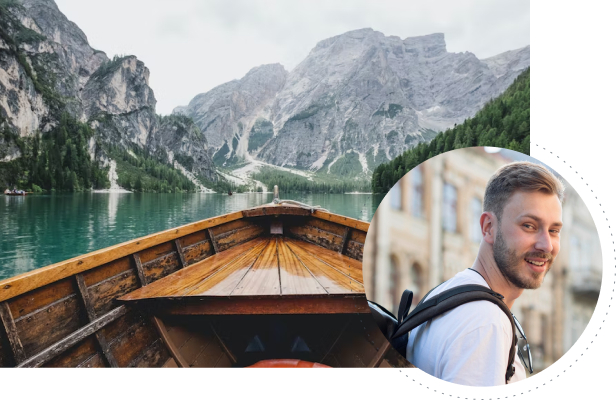SUGGESTED LENGTH OF STAY
Botswana is famous for its wildlife and beautiful scenery. You could easily lose yourself in the many Game Reserves for 2-3 weeks. Below are our suggested lengths of stay in the key areas.
Chobe National Park 2-3 nights, Linyanti & Savuti Game Reserve 2-3 nights, Okavango Delta 2-5 nights, Moremi Game Reserve 2-3 nights, Makgadikgadi and Nxai Pans 2-4 nights, Kalahari Desert 2-4 nights.
Modes of transport
Road
Generally, one can self-drive into Botswana from Namibia or South Africa, however, most safari camps can only be accessed by light aircraft.
Air
From Australia, you will fly into O.R. Tambo Airport in South Africa before transferring to Botswana.
There are flights between Johannesburg and Maun, a gateway to the Okavango and other Safari Reserves, and Gaborone and Kasane.
Regular flights from Johannesburg to Maun can be booked with Airlink and Air Botswana.
Shuttle/charter flights are the only way to reach most camps in the Chobe, Moremi, Central Kalahari and Okavango Delta areas. Scheduled light aircraft flights depart from Maun and Kasane and handle all inter-camp transfers in this area.
Boat
Traditional wooden dugout canoes called ‘Mokoros’ are typically used to navigate the waterways of the Okavango Delta. Some water-based camps can only be accessed by a motorised boat. Houseboats are also available to hire for exclusive use or set group departures.
Climate
Botswana’s climate is semi-arid. Though hot and dry for much of the year, life-giving rains fall during summer. Rainfall tends to be unpredictable and highly regional. Often a heavy downpour may occur in one area, while 10 or 15 kilometres away, there is no rain at all.
January – March: Summer
High rainfall and high temperatures. Highs range from 35°C to 45°C. Lows around 18°C.
April – May: Autumn
Dry and warm, cool evenings and mornings.
June – August: Winter
No rainfall. Cold nights and early mornings. Days are sunny and generally warm.
Temperatures range from 15°C to 30°C. Nights can drop below freezing in some areas.
September – October: Spring
Dry and warm. October can be extremely hot.
Nov – Jan: Summer. High rainfall and high temperatures. Highs range from 35°C to 45°C. Lows around 18°C.
Food
The national dish of Botswana is called Seswaa. This consists of a meat stew served over thick polenta.
A large selection of dishes is available whilst staying at the Safari Camps. Everything from wood-fired pizzas to delicious salads served with fish or meat. You may also experience a Boma dinner whilst on Safari. An authentic African BBQ complete with dancing and singing under the open skies.
Drinking water
Botswana tap water is purified and is safe to drink at hotels, lodges and other public places.
Visas
Australian citizens do not require a visa for stays up to 90 days. Oasis accepts no responsibility regarding the issue of visas.
Money
The currency is the Pula (P). US Dollars is widely accepted in Botswana; however, notes dated before 2003 are no longer accepted and high denomination notes may not be accepted.
Banking hours at most commercial banks are Monday to Friday from 08h30 to 15h30 and on Saturday from 08h30 to 11h00.
ATMs are found throughout Botswana’s major city centres and shopping complexes.
Most restaurants, shops and hotels accept Visa, MasterCard, Diners Club and American Express. Proof of identity may be requested, so always carry a passport or some form of photo identification. Credit cards are not accepted at petrol stations.
Inoculations & health precautions
Some safari camps are situated in malaria-risk areas; having good medical insurance before travelling is vital.
Consulate Assistance
Australian Consulate, Gaborone
Plot 50637, Block 10, Airport Road
(Next to Airport Junction Shopping Centre)
Gaborone, Botswana.
Phone: + 267 390 2996
Fax: + 267 391 4293
Mobile: + 267 7133 1550
Email: australia.consulate.botswana@gmail.com
Electricity
Voltage: 220-240 Volts
Great Britain | South Africa
Lodges in the more remote areas of Botswana do not have electricity. These lodges generally rely on generator power for lighting and refrigeration, but this power only runs at critical times of the day. Please be aware that you will not find a plug socket in your room/tent at many of these lodges.
Getting there
South African Airways and Qantas are the main International airlines that depart from Australia.
Non-stop flight time Sydney – Johannesburg approximately 14 hours
Non-stop flight time Johannesburg – Maun approximately 2 hours
Frequent flights link Johannesburg to Gaborone, Maun and Kasane – the gateways to the national parks and wildlife areas.
Time difference GMT – 2 hours
Tipping Guideline
Guide – USD$10 per person per day
Camp Staff – USD$5 per person per day

Ready to discuss your trip to Botswana?
Speak to one of our travel specialists and we’ll create your personalised itinerary just for you.
